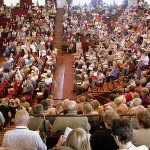 An unsettled question in the law of limited purpose public forums is whether forums that are made available for broad purposes can exclude religious worship. In a trio of cases culminating in Good News Club v. Milford Central School, the Supreme Court has made clear that religious uses that are within a forum’s purpose cannot be excluded because they are religious. Thus, the Milford school, having decided to make its facilities broadly available for after hours community use, could not exclude the Good News Club, an evangelical Christian group who wished to conduct bible study and related activities for children.
An unsettled question in the law of limited purpose public forums is whether forums that are made available for broad purposes can exclude religious worship. In a trio of cases culminating in Good News Club v. Milford Central School, the Supreme Court has made clear that religious uses that are within a forum’s purpose cannot be excluded because they are religious. Thus, the Milford school, having decided to make its facilities broadly available for after hours community use, could not exclude the Good News Club, an evangelical Christian group who wished to conduct bible study and related activities for children.
Some have read Good News Club (incorrectly in my view) to recognize a distinction between worship and other forms of religious uses. In this paper (forthcoming in the Mississippi Law Journal), I draw on the theology of Christian worship (which I think broadly applies to many other religious traditions) to argue that worship, while sometimes seen as noncommunicative and deliberative, is, in fact, both and ought not to be excluded from broadly defined forums.
Here’s a related question.
Of course, one response to the inability to exclude worship and other forms of religious worship is to close or limit the scope of the forum. That’s apparently what happened here (although the proposed use was not worship). A public library that made its facilities available to the community for a variety of uses refused to make it available to someone who wanted to give what I take to be biblically themed financial planning. They were sued and responded by limiting its facilities to library uses.
I wonder (and I do not pretend to know or even have a view on the matter) whether there ought to be a remedy for this. Is it like Palmer v. Thompson, in which a sharply divided Court rejected a challenge to a town’s decision to close municipal swimming pools rather than integrate them? What if a plaintiff could establish a “discriminatory” purpose? What would that amount to in a case like this? Given that the Court has held that it is viewpoint discrimination to exclude religious uses, does a decision to close a forum for the purpose of preventing a religious use permissible? Or is this case like Locke v. Davey, in which the state can refuse to provide a subsidy to religious uses (something which is hard to reconcile with Good News)?
My instinct is that a municipality can close its forum although I am not sure that many will choose to do so. What is less clear to me is how close a question it can be made to be.
Cross posted at PrawfsBlawg.
